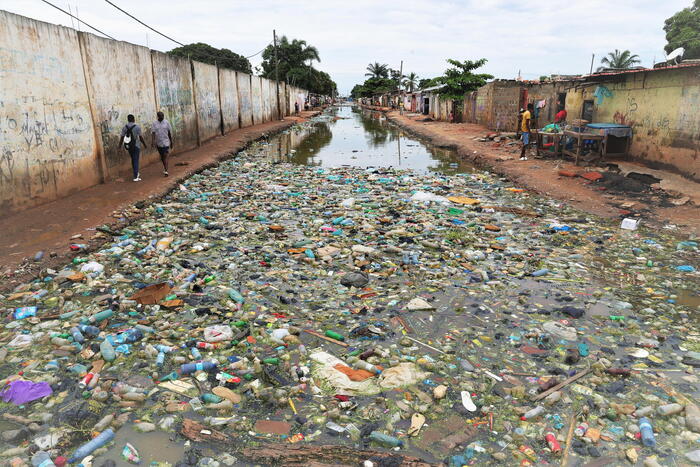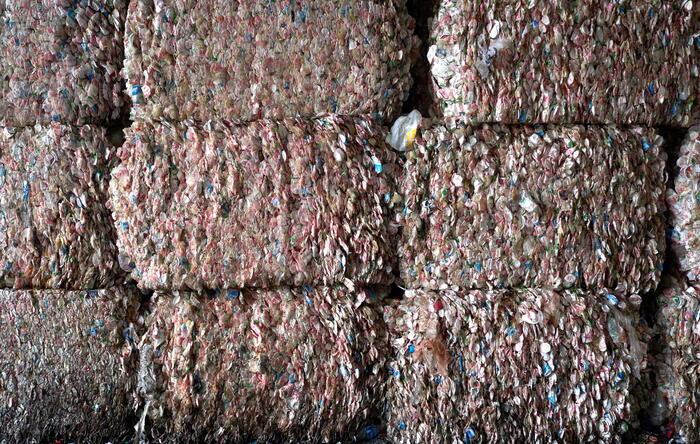Tableware made from bamboo, sugar cane, paper: there are many alternatives to single-use plastic.
No wonder, there will soon be a plastic ban.
But some substitute products are harmful.
Berlin / Düsseldorf - goodbye to ice cream spoons, plastic straws and plastic plates: On July 3rd, two ordinances will come into force in Germany.
One prohibits the manufacture of numerous plastic products across Europe, the other imposes a
labeling requirement
on some products
, informs the consumer advice center in North Rhine-Westphalia.
The aim of the directive adopted by the EU in 2019: to reduce plastic waste * and thus protect the oceans and the environment from a persistent plastic flood.
According to the European Consumer Center Germany
, the ban applies to the production of ten single-use plastic items, which make up 70 percent of marine litter.
Plastic cutlery and cotton swabs with plastic sticks are no longer produced
From July, manufacturers will not be allowed to produce
cutlery, cosmetic cotton swabs, balloon sticks, stirring sticks, plates, bowls and drinking straws made of plastic
.
Styrofoam food and beverage containers are also prohibited.
With a small but: dealers and restaurants are allowed to pass on remaining stocks - so that they don't end up in the trash without being used.
Also permitted, but must be labeled, for example, for disposable paper cups with a plastic coating, as well as wet wipes, feminine hygiene articles, cigarettes and tobacco products with filters.
The environmental impact should be explicitly pointed out here.
Bio-plastics are difficult to compost, aluminum consumes a lot of energy
Avoiding plastic sounds good at first - and doesn't seem difficult. Because there are many alternatives. But not all are recommended. "Consumers shouldn't be dazzled by greenwashing," says Katharina Istel from the Naturschutzbund Deutschland (Nabu).
Because alternatives made from bio-plastics are not made from petroleum, but they are difficult to compost
. Paper puts pressure on deforestation. Aluminum consumes a lot of energy. And plastic-free disposable tableware made of cardboard, palm leaves and sugar cane can often contain substances that are hazardous to health, warns the Federal Association of Consumers (vzbv).
In a test by the “Stiftung Warentest” in August 2019, bamboo cups also came off badly. They are therefore not suitable for filling hot drinks because harmful substances are produced. In addition, the cups tested at that time contained not only bamboo, but also
plastic
. The "Stiftung Warentest" saw consumers deceived by a false ecological promise.
Istel recommends
avoiding disposable items
and using only reusable containers, for example made of polypropylene (PP), glass or stainless steel.
"However, stainless steel has to be used very often so that it is a more ecological alternative, because the raw material consumes a lot of energy in production." Consumer advice center NRW.
Reusable instead of disposable: when a deposit becomes a hurdle
But Istel also sees the problems. Especially with take-away food, a reusable system with a deposit is not easy to implement for the already troubled restaurateurs. Not everyone has their own can,
cutlery or mug with them.
For reasons of hygiene, restaurants are often only allowed to use their own dishes.
Istel fears that consumers could be put off by the deposit of the containers to be borrowed.
However, innovative apps are currently being developed for this purpose, which instead of registering a deposit, registering where a container is and when it has to be returned.
Such models are more often conceivable in the future.
Bagasse and paper containers are disposable alternatives.
Bagasse is made from pressed leftover sugar cane and is therefore a waste product.
It is therefore a little better than paper from an ecological point of view.
The best thing, of course, is always: do not cause any rubbish at all.
Grain-based straws: innovative ideas for avoiding waste
Apparently resourceful restaurateurs have replaced plastic drinking tubes with edible varieties - such as macaroni noodles or grasses as drinking straws. The latter can be contaminated with mold and the pasta is then thrown away, so that the choice should ideally fall on a reusable straw. Stiftung Warentest has now taken a closer look at edible drinking straws - made from durum wheat semolina, rice and tapioca as well as sugar.
The cereal-based straws were most convincing - they kept their shape for a relatively long time in cold drinks.
Conclusion in the current issue of the magazine “test” (7/2021): All tubes can be used to drink, but stalks made of sugar are botch. Overall, the testers found hardly any pollutants - if at all, only in such small amounts that they are irrelevant in the consumption amounts. But long-lasting, reusable products are best for the environment.
For example, shatterproof glass tubes, stainless steel straws or silicone tubes.
In the cosmetics sector, the cotton swabs, which will be banned in the future, are particularly noticeable
.
Sustainable alternatives are washable reusable silicone sticks or, under certain circumstances, a washcloth with water.
There are also cotton swabs made from bamboo and paper.
Here, bamboo is ecologically preferable to paper, because the processing is less expensive, according to the consumer advice center in North Rhine-Westphalia.
(dpa)
Read more
: Freezing without plastic: There are many alternatives *
* 24garten.de and Merkur.de are offers from IPPEN.MEDIA.
Consumption in green times
Consumption in green times




/cloudfront-eu-central-1.images.arcpublishing.com/prisa/ILLMSM3CL5EZTGR5TPAFNGGS6Y.jpg)



